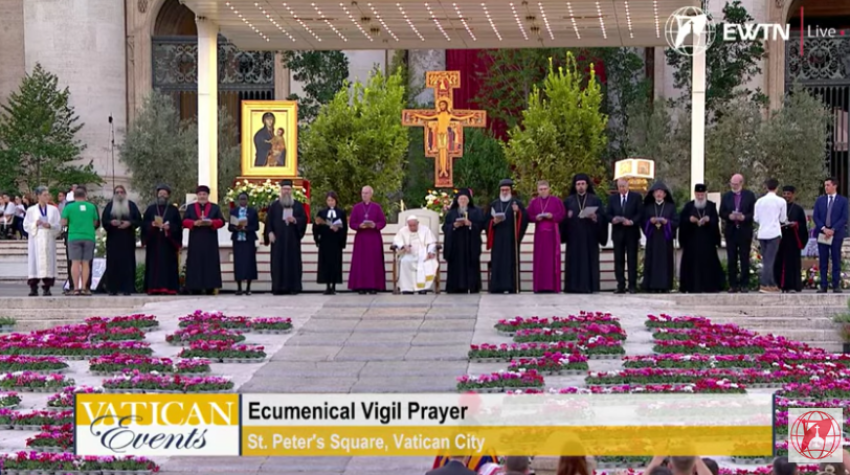Italian Evangelical leaders criticize World Evangelical Alliance for ecumenical prayer at Vatican

Evangelicals in Italy say the participation of an international Evangelical group in an ecumenical prayer with Pope Francis and other Christian-identified organizations was tantamount to “crossing a line” that could potentially threaten Church unity around the world.
The Italian Evangelical Alliance (AEI), which represents roughly 85% of Italy’s roughly half-million Protestants, criticized the World Evangelical Alliance (WEA) after one of its leaders took part in an ecumenical prayer vigil during the “Together 2023” event at the Vatican ahead of the first session of the Roman Catholic Synod of Bishops.
Calling the event an “ecumenical vigil,” the AEI federal executive board released a statement saying the group was “confused and disappointed” by the participation of Thomas Schirrmacher, WEA’s Secretary General, in a prayer with the pope.
The statement read in part: “With the ‘ecumenical vigil’ in which WEA's top representative participated, we now have crossed the line. WEA is now spiritually part of the ecumenical movement."
The AEI board also criticized the use of Marian iconography in the event.
“Once you pray publicly with the Pope, in St. Peter’s square, in front of a Marian portrait, embracing the message of spiritual unity with liberals and orthodox leaders, your alleged distinction becomes secondary. Evangelical identity is absorbed into the ecumenical unity with [the Roman Catholic Church] and [the World Council of Churches],” the statement read.
A copy of the “Together 2023” program included prayers in various languages with text such as “For the leaders of all our Churches and Christian communities, may they be ever more committed to promoting the visible unity of all who follow you. May they build bridges of dialogue and friendship with believers of different religions.”
The program also included prayers for “victims of climate change and pollution,” “all who suffer violence and war,” and “victims of violence, harassment and abuse, in the Church and in society.”
Catholic media reportedly streamed the “Together 2023” event.
In response to the criticism, Schirrmacher said while controversy often results from attending such events, his participation on behalf of WEA is not “synonymous with what we understand as the true body of believers.”
“Evangelicals are seen as part of the global Christian community in the eyes of the wider world,” Schirrmacher said in a statement. “This includes Muslim or secular states and organizations, which know all of us simply as 'Christians.' To give any of them the impression that we are not part of world Christianity by distancing ourselves from other churches, and by refusing even personal friendship with their leaders, as some sects and cults do, might have devastating effects on our work for Christians suffering discrimination and persecution.”
He also addressed some of the questions that might arise as to “why Evangelicals should be praying for the synod of the Catholic Church.”
“Firstly, praying does not mean that I necessarily agree on any of their particular views or positions. At the same time, the outcomes of these two synods (2023 and 2024) might have a great influence on Christians worldwide,” he added. “That in itself is good reason to pray.”
Schirrmacher added that despite Christian denominational differences, the ultimate goal is unity in Christ.
“Our core desire is to see Christians everywhere unified in Jesus Christ. As we pray and work for unity for the whole church, unity will only come when we are centered in Jesus as described and witnessed by the Bible,” he said.
“Our vision and calling are clear: we speak for Evangelicals and seek to bless the world through our many national alliances by our witness, our public defense of the gospel, our solidarity in prayer and evangelism, and lifting up Jesus, in whose name alone is our salvation, to the world.”



























